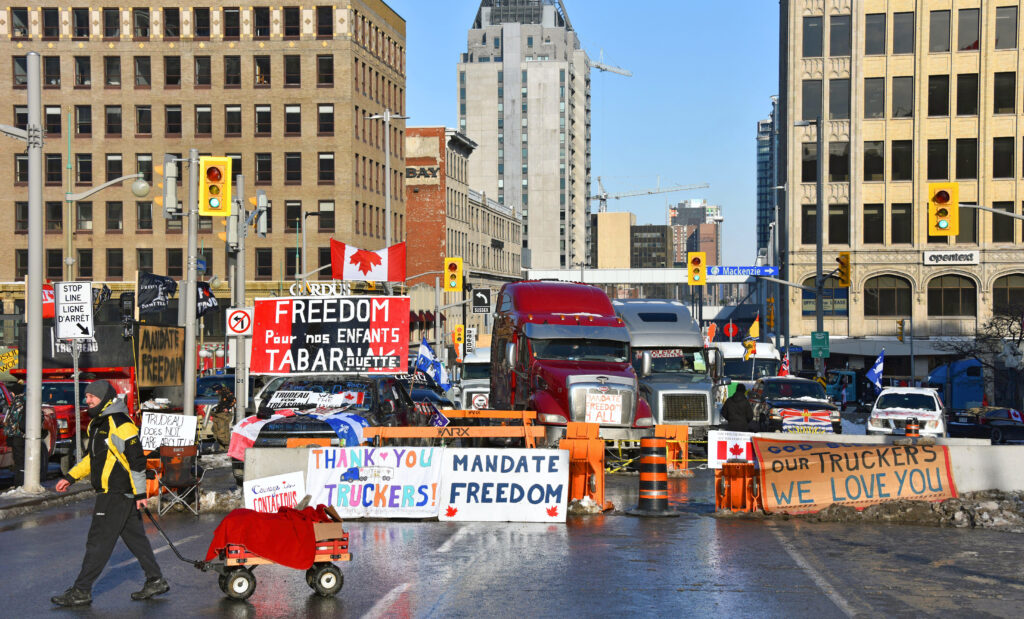
If money and the state are
broken, fix both with bitcoin
The fiat system is crashing against its own limitations to the detriment of the liberty and security of citizens and dissidents the world over. The promise of bitcoin stands waiting in the wings to offer relief to all who are affected.
Lesen Sie die deutsche Version hier.
In May 2022, I found myself inside Norway’s Parliament building in Oslo. Several members of Norway’s parliament had proposed to ban Bitcoin mining in the country. I was talking to several of them as part of a twelve-person group sent by members of the Human Rights Foundation. The goal of the Human Rights Foundation is to help provide basic rights for people in authoritarian or semi-authoritarian regimes. They protect freedom of speech and expression, the right to equal treatment, due process, and much more.
A few human rights activists in the group were from Nigeria, and they described how, when their bank accounts were frozen for protesting excessive violence by police in their country, they turned to Bitcoin for donations instead. The same had been true for Vladimir Putin’s domestic political opposition, Alexei Navalny. Faced with frequent bank account freezes, Navalny’s organization in Russia had made use of Bitcoin to collect and move funds to support their legitimate political opposition against Putin’s dictatorial behavior.
When it came to me, I described how the Bitcoin network tends to use cheap and stranded (unused) energy, while being useful for its unique type of demand flexibility. Norway’s electrical grid consists of over 90 percent clean hydro power, and especially in the northern part of the country they have plenty of stranded resources to help support such a valuable network. Private companies were already happily doing it, and my view was that there was no reason for the government to step in and stop them from doing so.
Frozen banks in Canada
Several months prior to that meeting, there was a large trucker convoy protest in Canada, which had gathered people across the country into the nation’s capital to protest Covid vaccine mandates and mobility restrictions. In 2021, Canada had enacted increasingly strict policies around mobility. People could not ride trains or planes without proof of vaccination, so they were restricted from moving within the country and, importantly, had no realistic way to leave the country if they were not vaccinated. In early 2022, Canada further tightened restrictions by requiring truckers entering Canada to show proof of vaccination.

Any large protest has extremist characters associated with it, but by and large the Canadian trucker protests were peaceful. They were supported by many regular people who felt boxed into a corner. The whole purpose of protests is to create awareness through disruption, which costs the protesters time and money.
Donations began to pour in to support the protestors, with both fiat currency and Bitcoin. Benjamin Tyler Perrin, a well-known educator regarding Bitcoin-related technologies, helped put together a donation portal for people to send Bitcoin to support the truckers. Perrin, who had previously voted for Prime Minister Justin Trudeau’s party but who had later opposed their imposition of vaccine mandates and mobility restrictions, thought the donations would be small and uncontested by the government. However, as numerous donation portals such as GoFundMe were told to shut down their services without funds being delivered, the Bitcoin network became one of the only ways for donations to make it to the intended recipients.
The government of Canada subsequently enacted emergency powers and began telling banks to freeze the bank accounts of certain protesters, as well as individuals that had merely donated to protesters. Many of these freezes were without court orders, and the line between government and bank actions became blurred.1 Someone ought to have told the government that technologies that make it harder to freeze money are not about avoiding legitimate laws, but rather, are about ensuring that governments themselves follow their own laws.
This touches on an age-old political debate between individualist and collectivist policies. A similar concept applies to the broad practice of civil forfeitures. In the United States, billions of dollars per year in cash, jewelry, and other valuables are taken from people by police without charging them with a crime. If someone travels through an airport with cash or valuables or gets pulled over while carrying a lot of cash or valuables, in many jurisdictions the police can simply take these goods despite not charging the person with a law violation. The person then must go through time-consuming and expensive proceedings if they have any hope of getting their assets back, which is a bigger hurdle for people who aren’t wealthy.
Financial censorship against protestors or political opposition is a common tool in authoritarian and semi-authoritarian regimes, but shades of it occasionally pop up in democracies as well, usually during or after extreme events. For real freedom to exist, however, it must be held above any specific interest, rather than something that is easy to take away from groups that we may not like. In other words, due process should occur for the most virtuous groups and the most odious groups alike. This cannot occur in an environment in which Bitcoin itself is subject to the whims of partisan political divides.
The politics of Bitcoin
As of this writing, there are more politicians associated with the Republican Party in the United States who embrace Bitcoin compared to politicians associated with the Democratic Party, although there are some of both. From its inception Bitcoin has always had somewhat of a political element to it. It’s the world’s largest and most successful attempt at a stateless digital currency, and that fact carries some political weight to it. Encryption initially allowed for the private sharing of information, and now encryption also allows for the private sharing of value. Information and value are two vital components needed for individuals to conduct trade.
Today, Bitcoin as a network collects members of the left and right, and partially organizes them in an emergent way by giving them something to use and build on, so that they don’t have to rely only on protesting. It offers them a way to potentially opt out of the existing financial system that they view as being heavily corrupted, and to build a parallel peer-to-peer financial system instead. It is for this reason that many proponents of the Bitcoin network describe their activities as a peaceful revolution. So, while the technology does have political implications, it’s not inherently partisan.
A theme that many left-leaning Bitcoin proponents have in common is that they view the Bitcoin network as a tool to curtail the overreach of corporations and crony capitalism, in similar ways that right-leaning Bitcoin proponents view it as a tool to curtail the overreach of the state. At the highest levels of power, governments and corporations become intertwined anyway, with Big Defense, Big Food, Big Agriculture, Big Pharma, Big Tech, Big Oil, and so forth all having considerable influence over spending-related legislation. With such a flexible public ledger, governments can favor any corporation they want, and corporations can use their financial clout to help ensure that their preferred government officials get into power and stay there in return for favors. There’s a revolving door for the regulators and the regulated, and Bitcoin was designed to take back part of that public ledger.
Bitcoin developers and educators are often not the “white crypto bros” or “shadowy super-coders” that politicians and media make them out to be. There are people of many different backgrounds across the political spectrum and around the world who, for a variety of reasons, have found the idea of an open-source ledger that gives power to individuals to be an important thing to dedicate their work toward. While there is a lot of fraud and grift in the broad cryptocurrency ecosystem such as when unregistered security tokens are created out of thin air and dumped on retail investors), people working in the Bitcoin-only space have tended to be doing what they do for ethical and pragmatic reasons.
Populism comes in many forms, but the far sides of the political spectrum contain several extremist elements. In an increasingly chaotic world, people often want order at any cost, even if it includes giving up some liberty. They want to be told by a seemingly strong leader what the problem is and what the plan will be to fix it. Sadly, what the strong leader designates as the problem usually ends up being a misdiagnosis that sacrifices the most vulnerable in society in favor of the majority, or that breaks down the economic incentives that create the efficient production of goods and services.
As some civilizations gained large technological advantages over others, this gave the former a way to basically control the ledgers of the latter. With the rise of banking and central banking in a telecommunication-enhanced world, where gold was too slow to serve as money, the ledger became increasingly centralized and controlled by nation states.
Governments and their central banks essentially acquired a monopoly on fast, long-distance money transmission, which gave them more flexibility to devalue the savings of people within their borders and channel that value toward their goals in opaque ways. Going forward, bottom-up digital monies such as Bitcoin attempt to give the ledger back to the people, while top-down digital monies such as central bank digital currencies give nation states even more control over the ledger that people use.
«Bottom-up digital monies such as Bitcoin attempt to give the ledger back to the people, while top-down digital monies such as central bank digital currencies give nation states even more control over the ledger that people use.»
If some group can create money at a cost that is significantly below the current market value, then they have gained the power of seigniorage, and therefore control the ledger entirely or in part. In contrast, if nobody can create money for free, such as in a world of collectible commodity proto-monies between tribes of similar technical proficiency, then nobody has the power of seigniorage, and nature alone controls the ledger. If one group gains a sufficient degree of technical superiority over another culture, and becomes able to cheaply create the glass beads, shell necklaces, rai stones, cocoa beans, or other such stores of value that the group with less technology stores their wealth in, then they have gained the power of seigniorage.
In fiat currency systems, sovereign governments and central banks can create money nearly for free, which everyone else is supposed to treat as valuable within a jurisdiction, even as it is continually diluted. Many countries mismanage their ledgers dramatically, resulting in massive increases in the money supply and aggregate prices. When people try to flee from it toward other ledgers or assets to protect their savings, authorities rarely take responsibility for the problem and instead tend to blame speculators and outside forces, and therefore often try to block the exits.
Gold has long been turned to as a form of savings, but it’s not a useful transactional money in the digital age. The Bitcoin network presents a newer and faster alternative, where nobody can create Bitcoin for free, and thus nobody has the power of seigniorage. Similarly, nobody can censor transactions unless they control over 50 percent of the network’s active processing power. And it can move globally without the need for central banks as bottlenecks. However, the network is still in its relative infancy, and it remains to be seen how robust it will be in the face of bigger attacks from large governments that may try to protect their own centralized monetary systems as they become destabilized from their own entropy over time.
The idea of separating money and state is not about eliminating the state. Instead, the idea is about creating a decentralized monetary technology that, if it were to be widely adopted and resistant to attacks, would put the state more on a level playing field with everyone else. Governments would need to be more transparent with their actions in a world where fast, portable, self-custodial, globally transmissible, debasement-proof peer-to-peer money is widely held, since it gives people more options. With 160 fiat currencies in the world, and over half of the world’s population living under various shades of authoritarianism, this is no small objective. Open-source money in the form of Bitcoin may eventually become large enough to compete with the U.S. dollar more directly, but the low-hanging fruit for now is that the technology offers an alternative to billions of people who use failing currencies in any number of jurisdictions that many people rarely think about. It also allows for much faster innovation in money and opens entirely new applications that are not possible with existing technology.
If politics in many parts of the world continue to shift away from freedom and toward varying levels of authoritarianism as they have in the past two decades, then control of the public ledger may become even more important than it has been in recent decades. In less free parts of the world, the user of a centrally controlled currency has decreasing control and decreasing transparency into how the public ledger is being managed. At the same time, governments and corporations have increasing control and insight into everyone’s small allocation of the ledger, including how much they have and how they are allowed to use it.
While politics can impact how we interact with money locally and temporarily, it’s technology that impacts how we interact with money globally and permanently. As new technologies come into existence, certain types of ledgers become obsolete and go extinct while new types of ledgers are born and become necessary. That’s why new forms of money tend to be adopted everywhere rather than just locally. As the world became increasingly industrialized, gold won out over every other commodity. And then as the world became increasingly connected by telecommunication systems, fiat currencies displaced gold in every country. Now that digital scarcity and digital settlement exist as new forms of technology, there is an opening for a new monetary era yet again.
«Now that digital scarcity and digital settlement exist as new forms of technology, there is an opening for a new monetary era yet again.»
We cannot know the future. The best that we can do is analyze the present, envision what we think the future should be like, and then play our individual roles to move toward that vision. In my view, open-source decentralized money that empowers individuals, that is permissionless to use, and that allows for a more borderless flow of value, is both powerful and ethical. The concept presents an improvement to the current financial system in many ways and provides a check on excessive power, which makes it worth exploring and supporting.
Ben Perrin, “Enemy of the State,” What Bitcoin Did, December 22, 2022. ↩













